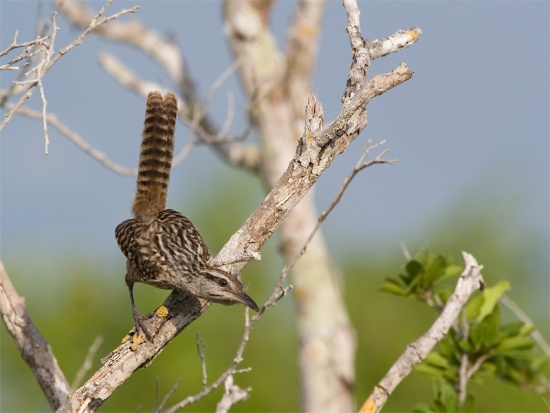(add bird sound) |
(id, remove incomplete, behav) |
||
| Line 1: | Line 1: | ||
| − | |||
;[[:Category:Campylorhynchus|Campylorhynchus]] yucatanicus | ;[[:Category:Campylorhynchus|Campylorhynchus]] yucatanicus | ||
[[Image:Yucatan_Wren.jpg|thumb|550px|right|Photo by steenl<br />Photo taken: Celestun, Yucatan Peninsula, [[Mexico]].]] | [[Image:Yucatan_Wren.jpg|thumb|550px|right|Photo by steenl<br />Photo taken: Celestun, Yucatan Peninsula, [[Mexico]].]] | ||
| Line 5: | Line 4: | ||
==Identification== | ==Identification== | ||
| + | Juvenile less strongly marked than the adult | ||
==Distribution== | ==Distribution== | ||
northern Yucatán Peninsula, [[Mexico]]. | northern Yucatán Peninsula, [[Mexico]]. | ||
| Line 13: | Line 13: | ||
Dry shrubland and coastal strip of the northern Yucatán Peninsula. | Dry shrubland and coastal strip of the northern Yucatán Peninsula. | ||
==Behaviour== | ==Behaviour== | ||
| − | It forages on the ground, and the diet includes insects, lizards and fruits. | + | Usually skulking and therefore difficult to see. It forages on the ground, and the diet includes insects, lizards and fruits. |
| − | The male | + | The male builds several nests on a tree which the female inspects. If she does not like any,the male rebuilds them and even constructs more, making the tree look like a nest colony. 3 to 4 eggs are laid and are incubated by both sexes. Both parents feed the young. The young fledge after 1 month. |
====Vocalizations==== | ====Vocalizations==== | ||
<flashmp3>20120503_063840_Yucatan_Wren-edit.mp3</flashmp3><br /> | <flashmp3>20120503_063840_Yucatan_Wren-edit.mp3</flashmp3><br /> | ||
Revision as of 02:40, 8 June 2012
- Campylorhynchus yucatanicus
Identification
Juvenile less strongly marked than the adult
Distribution
northern Yucatán Peninsula, Mexico.
Taxonomy
This is a monotypic species.1
Habitat
Dry shrubland and coastal strip of the northern Yucatán Peninsula.
Behaviour
Usually skulking and therefore difficult to see. It forages on the ground, and the diet includes insects, lizards and fruits.
The male builds several nests on a tree which the female inspects. If she does not like any,the male rebuilds them and even constructs more, making the tree look like a nest colony. 3 to 4 eggs are laid and are incubated by both sexes. Both parents feed the young. The young fledge after 1 month.
Vocalizations
<flashmp3>20120503_063840_Yucatan_Wren-edit.mp3</flashmp3>
Listen in an external program
Recording (not very good quality) by NJLarsen at Las Coloradas Rd, Yucatan, Mexico, 3 May 2012.
References
- Clements, JF. 2008. The Clements Checklist of Birds of the World. 6th ed., with updates to December 2008. Ithaca: Cornell Univ. Press. ISBN 978-0801445019.




